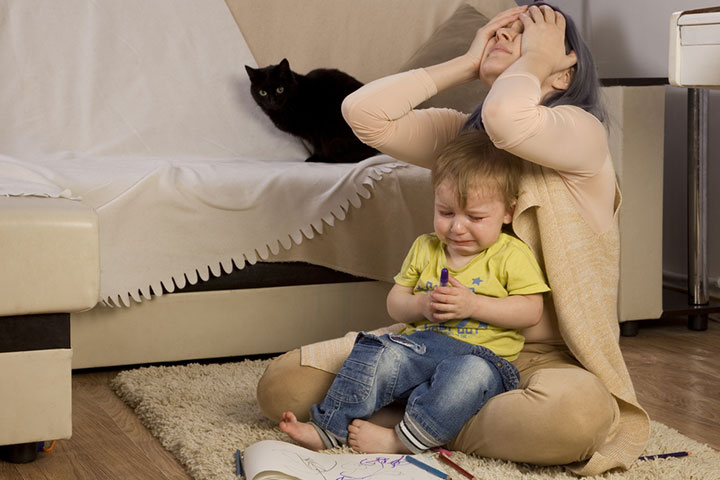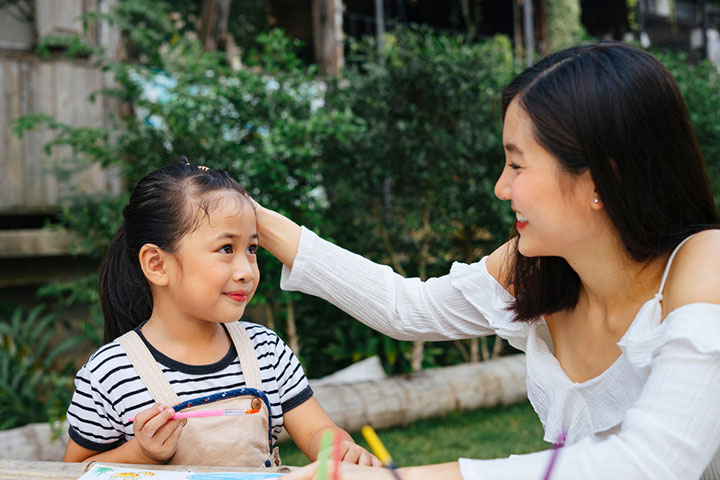
Image: Shutterstock
Learning to unlearn undesirable behavior is hard for even the most disciplined adults. So, you can imagine just how hard it can be for your little one. However, sometimes it is best to put in that effort as early as possible in order to break a bad habit. Whining is most definitely one of them. Not only does it drive people crazy, it’s also an awful way for your child to express themselves. But you must keep in mind that your child may not be annoying you by whining deliberately. Sometimes they just don’t have enough words to describe how they feel or what they want. And whimpering is a sure thing when it comes to grabbing your attention. In any case, if you’d like your child to stop whining for no reason, then we’ve got a couple of tips for you. Read on to know them all!
1. Don’t Get Frustrated
Image: Shutterstock
The best thing to do to stop the whining is to make your kids understand that it will not elicit any reaction from you, especially negative ones. If you want your kids to stop whining, don’t show them how much it bothers you. Otherwise, they will see that their behavior made you pay extra attention to them and they will continue this behavior everytime they want to be the center of attention. And if you have a toddler, you know that’s almost every other minute. Instead, explain to them in a calm voice that you can’t understand them or what they want. Ask them to calm down and use their words and gestures. This will help them stop whining sooner because they will realize that it did not have the desired effect and may also be counterintuitive.
You and your little one can also pick out a warning sign that they need to adhere to which will remind them of a new rule. For example, if your child starts whining, you can gently tug their ear and not respond. You can even leave the room so that they understand that this kind of behavior won’t be tolerated.
2. Make Sure Your Child Knows How To Ask Nicely
Image: Shutterstock
Sometimes children resort to whining and whimpering as this is the only way that they know how to express emotions and wants. They may want to complain or simply voice their opinion but may lack the ability to do so which can leave them feeling frustrated and helpless. This often triggers tantrums and long whiny sessions. In truth, your child may not even realize how annoying and frustrating this can be for you. This is why you must take the time to explain to your kids the difference between how they approached a scenario and what they could have done to get the results they wanted. Giving them alternative pathways to express their emotions and needs in healthy ways will ensure that they put an end to the whining episodes. You can also record them when they are being polite and when they whine and ask them which version is easier to understand. This will help them understand how they sound and what kind of behavior is better.
3. Compliment Your Kid When They Use Their Normal Voice
Image: Shutterstock
Instead of reprimanding your child endlessly whenever they get on your nerves, compliment them when they do not. Most parents don’t do this as they see it as behavior that they expect from their kids. But how will your children know what behaviors to model if you never encourage them to repeat it? When it comes to kids, positive reinforcement works better in most cases, and this is no different. Thank your kids for being nice and polite in order to reinforce positive behavior. This will show them that the way they asked had an impact on the way you behaved. They will observe that it didn’t make you mad and that you met their needs a lot faster than if they had thrown a tantrum.
4. Let Them Know That There Will Be Consequences
Image: Shutterstock
Your child must understand that every action has consequences. So if asking them nicely to stop whining doesn’t work, you don’t have to continue to put up with their antics without them facing the consequences of their behavior. Instead, talk to them about what will happen if they start whining without a reason again. For example, tell them that they will go on time out until they calm down and are able to communicate what they want better. Then, if they forget about this rule or disregard it next time, ask them to stop whining just once. After that, the punishment for misbehaving should come right away. Make sure your punishment is constructive and age appropriate.
Getting your kids to stop whining every time they drop something or don’t get what they want may seem like an impossible task, but it doesn’t have to be. With these few tips, they’ll stop whining in no time. Happy parenting!
















